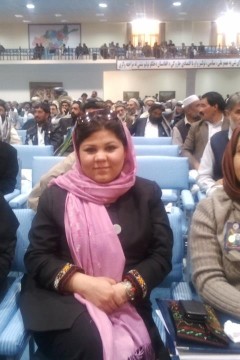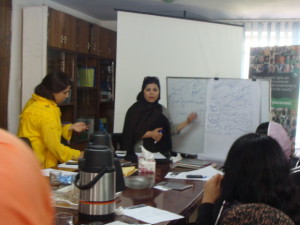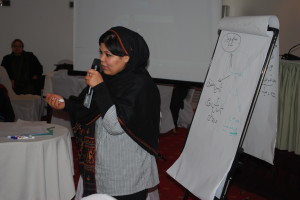
The country’s first Afghan woman-led organization focused on women, peace & security. Research Institute for Women Peace & Security (RIWPS) , established in 2012 by Wazhma Frogh & Sabrina Saqeb
“If Afghan women are supported and stood with, they will be able to institutionalize and make these changes more sustainable in the decade of transformation, in the next 10 years.” – Ms. Frogh
RIWPS is working closely with the High Peace Council focusing on women’s meaningful participation in the peace process as well as with local organizations and activists building community-based inclusive peace.
Research Institute for Women Peace & Security (RIWPS) is a woman-led initiative that focuses on increasing women’s leadership and inclusion in bringing peace and security to Afghanistan through research and evidence building and also strengthening the advocacy campaigns carried out many other women organizations.
Ms. Frogh says: “The unique aspiration of the Institute is to engage Afghan women and their strategic participation to improve social cohesion, restore war-torn communities, and restore relationships at the grassroots and national levels.”
Ms. Frogh has been engaged in the women’s movement in Afghanistan for more than a decade. She has participated in different loya jirgas (grand councils), lobbied for women ministers and members of parliament, and promoted women’s political participation through the 5 Million women campaign in 2009.
However, in 2010, Ms. Frogh realized that “we need an organization to focus on issues of security and women’s participation in the peace process,” so she founded RIWPS-Afghanistan together with a member of parliament, Sabrina Saqeb.
“We are working to ensure that women are protected and have access to legal protection and women are able to participate in the peace process so that their concerns and voices are heard.” RIWPS is training women at the Provincial Peace Councils so that they can become mediators and effective conflict negotiators with their communities.
RIWPS is also doing advocacy and campaigning on the implementation of the country’s first Elimination of Violence Against Women Law (EVAW) through monitoring the prosecution units in some provinces, connecting women at risk and victims of violence to services, and providing them referrals to legal and social support. RIWPS launched the outcomes of its first study on the implementation of EVAW Law at the Special Prosecution Units in 4 provinces in April 2012. Please see the report on www.riwps-afghanistan.org
In December of 2012, RIWPS had its first Women Peace & Security Forum with 50 women participants from 25 provinces of Afghanistan. For the first time, they had an opportunity to meet with the President of Afghanistan, the leadership of High Peace Council, and members of the Afghan government. They had a direct opportunity to share their accomplishments on fighting insurgency by mobilizing women and mothers and creating community conflict resolution mechanisms that usually leads to insurgency.
Ms. Frogh stated, “I went back to some of these provinces where these women are working and saw for myself that using the skills they learned in the forum, they are now more active, mobilizing more women and able to resolve conflicts. Because we connected them to the leadership of the country and High Peace Council members, they now have more powers in their own local government structures.”
One of the female members of the Provincial Peace Council in the West that is a member of the Forum, stated, “now I have my picture with the President, the governor listens to me more.”
Ms Frogh reflects on the road ahead: “we have a long way to go, but have come a long way all these 11 years. What worries me is that 11 years is not a very long time to institutionalize our accomplishments. Therefore, they are fragile and vulnerable to any deals. If Afghan women are supported and stood by, we will be able to institutionalize and make these changes more sustainable in the decade of transformation, in the next 10 years.”



No Comments